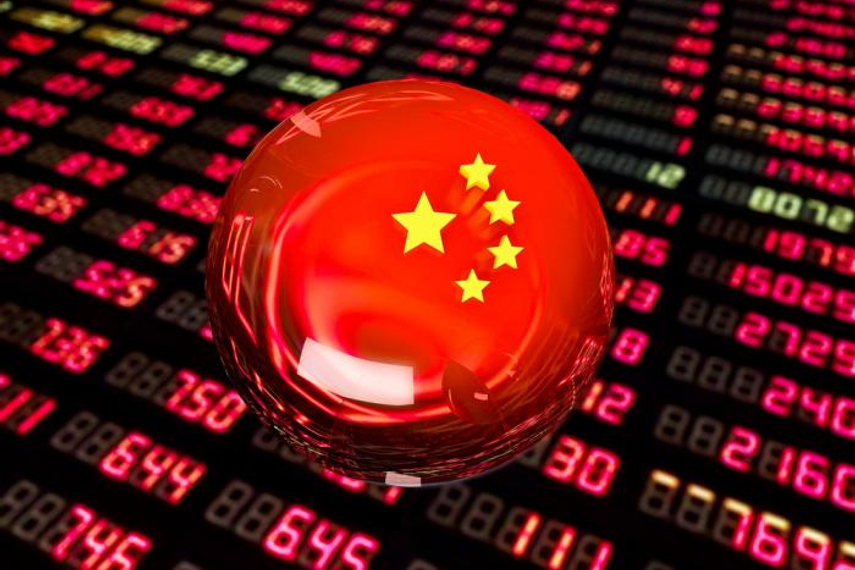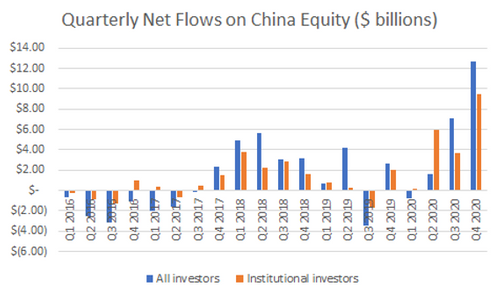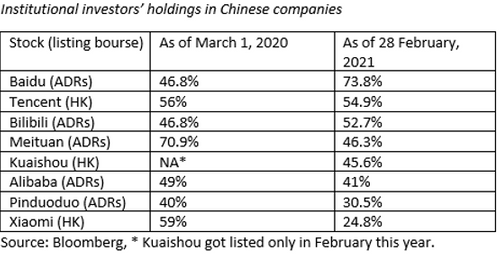
Institutional Investor Demand Accelerates for China Stocks
Some five months after Alibaba-backed Ant Group’s listing was pulled, institutional investor demand for Chinese stocks and initial public offerings is strong, despite the recent equity market pullback that has seen the CSI 300 fall 15% and the Hang Seng Index lose 9% in the past month.
Asset owner money has been flowing in during the past year despite the Covid-19 crisis, widespread warnings of a technology sector bubble, Beijing’s moves to tighten rules around fintech firms, and concerns over US restrictions on investments into Chinese stocks.
Chinese equities saw $20.6 billion of institutional investor net inflows in 2020 – more than the combined total of $19.5 billion for the previous three years, according to data from research house eVestment (see graph below). And those flows were accelerating during the course of last year. The research house said it could not provide data for 2021 yet, as it was reported on a quarterly basis.
It should be borne in mind that these flows include money from mainland Chinese and Hong Kong-based investors as well as those overseas.
Still, the indications are that the momentum from non-mainland investors is set to continue, despite reservations in some quarters.
There has been a sharp increase in demand for Qualified Foreign Institutional Investor (QFII) licences, which allows cross-border investment into mainland securities, since restrictions on this access channel were eased further in November. From November to March the total number of QFII licence applications has jumped almost 400% compared with the five months prior to November, according to data from Huatai Securities.
This rush of demand comes after investor interest in China’s equity market had flagged in recent years, amid regulatory concerns and Sino-US political tensions, Patrick Springer, managing director of institutional securities for Huatai Securities’ US business, told AsianInvestor.
“Global regulation of the internet is going to occur, not just in China,” he said, and that will mean a greater compliance burden for tech companies.
There are concerns, New York-based Springer added, “particularly in the biggest economies, that markets are getting concerned about the influence of technology platforms over the financial aspects of the economy”.
There are concerns, New York-based Springer added, “particularly in the biggest economies, that markets are getting concerned about the influence of technology platforms over the financial aspects of the economy”.
Last week Chinese regulators summoned 11 domestic technology companies – including Alibaba, Tencent and ByteDance (the firm behind Tik Tok) – for talks on use of ‘deep fake’ technologies on their content platforms.
This was just Beijing’s latest action to step up its scrutiny of the sector following the postponement of the Ant IPO in early November a few days before it was due to take place. And it has come after years of rising tensions and tit-for-tat trade and investment sanctions between former US president Donald Trump and Beijing.
While President Joe Biden is expected to take a less inflammatory approach than his predecessor, Chinese stocks could yet suffer more capital withdrawals if the new administration were to ramp up restrictions on investments into Chinese assets.
“That is a real risk,” said Effie Vasilopoulos, Hong Kong-based co-leader of the investment fund group at US law firm Sidley Austin.
But Beijing looks to be seeking other sources of capital to replace any potential US outflow, she said.
“We’ve seen China continue to develop trade links with Europe and other regions – [consider the] recent trade deal with Europe, the London Stock Connect, etcetera,” Vasilopoulos added. “There is a focus on maintaining links with the West but diversifying away from such a predominant focus on the US.”
In any case, Springer said he has US institutional clients that remain keen to invest in China and that overseas inflows are set to continue rising. Foreign investors hold less than 5% of the Chinese equity market, he noted, while in other Asian and global markets, international investors typically account for 30% to 40% of the market.
Clearly US asset managers take the same view: this year T. Rowe Price became the latest in a growing list of foreign fund houses to set up a research office in Shanghai.
IPO “FEEDING FRENZY”
One key area of interest for foreign investors – and a further indicator of strong sentiment in Chinese companies – is Hong Kong’s IPO market, particularly for family offices and hedge funds, Vasilopoulos said. Some 90% of the upcoming listings in the territory are mainland Chinese, and that proportion is accelerating, she added.
“Some of these companies are expected to double their listing price over the next 12 to 24 months,” she added. “It’s something of a feeding frenzy among hedge funds and family offices.”
And despite the concerns over high valuations in the tech sector and moves to tighten the rules around the sector, a common thread among the hottest IPOs in Hong Kong is many are tech-enabled or healthcare-related businesses, Vasilopoulos said.
Ultimately Beijing’s moves may be beneficial for the wider sector, argued US think tank Global SWF in its annual report in January. China’s State Administration for Market Regulation aims to prevent internet platforms from assuming a dominant market position or obstructing fair competition,it said.
“While Ant Group’s giant IPO has been thrown into doubt for the time being,” said the paper, “the move against anti-competitive behaviour could support China’s thriving tech ecosystem and therefore continue to fuel SOI [state-owned institutions’] venture capital [investments].”
That may help explain why institutional investors have reduced positions in the biggest e-commerce firms like Alibaba and Tencent in the past year, but increased their weight in other tech companies, such as Baidu and Bililbili (see table below).
Source- Haymarket Media Limited. All rights reserved.

